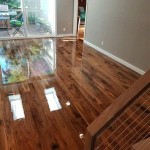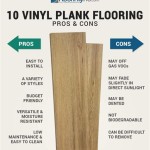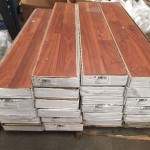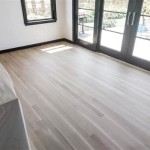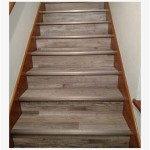Making the Right Choice: Engineered Hardwood Flooring vs Laminate
When it comes to flooring, engineered hardwood and laminate are two popular choices. Both offer distinct advantages, so it's important to understand their differences to make an informed decision.
Composition and Structure
Engineered Hardwood: Consists of a plywood or HDF (high-density fiberboard) core topped with a veneer of genuine hardwood, typically ranging from 1/8" to 1/4" thick. The core provides stability, while the veneer gives the floor the look and feel of natural hardwood.
Laminate: Comprises multiple layers, including a HDF core, decorative layer with a printed image of wood or other patterns, and a protective wear layer. Unlike engineered hardwood, it does not contain any actual wood.
Durability and Lifespan
Engineered Hardwood: Exceptionally durable, with a lifespan of 50-100 years. The hardwood veneer can be refinished multiple times, extending its life even further. It is resistant to scratches, dents, and moisture compared to laminate.
Laminate: Less durable than engineered hardwood, with an average lifespan of 15-25 years. The wear layer can withstand scratches and wear but can be susceptible to chipping and moisture damage. Once damaged, laminate cannot be refinished.
Water Resistance
Engineered Hardwood: Moderately water-resistant due to the plywood or HDF core. It can withstand spills and occasional moisture, but prolonged exposure can lead to damage. Engineered hardwood with a water-resistant finish is available for added protection.
Laminate: Not water-resistant. Even the most water-resistant laminate flooring can be damaged by moisture, making it unsuitable for areas prone to water spills or flooding.
Maintenance and Cleaning
Engineered Hardwood: Easy to clean, requiring regular sweeping or vacuuming. Use a damp mop with a pH-neutral cleaner for occasional deep cleaning. Avoid using harsh chemicals or abrasive cleaners.
Laminate: Requires minimal maintenance. Simply sweep or vacuum and occasionally wipe down with a slightly damp cloth. Avoid using abrasive cleaners or excessive moisture.
Environmental Impact
Engineered Hardwood: More environmentally friendly than laminate, as the veneer is derived from sustainable hardwood sources. The plywood or HDF core is made from recycled wood fibers.
Laminate: Less environmentally friendly due to the use of synthetic materials. It often contains plastics and resins, which can release harmful chemicals into the air.
Cost
Engineered hardwood is generally more expensive than laminate flooring due to the use of real wood. However, it offers a higher return on investment, as it can last significantly longer.
Conclusion
Both engineered hardwood and laminate flooring have their own advantages. Engineered hardwood is more durable, water-resistant, and environmentally friendly, but it comes at a higher cost. Laminate is more affordable, easy to maintain, and offers a wide range of design options, but it is less durable and water-tolerant. Ultimately, the best choice depends on your budget, lifestyle, and specific flooring needs.

Engineered Hardwood Vs Laminate
Engineered Hardwood Vs Laminate Flooring Floorings

Hardwood Vs Laminate Engineered Floors What S The Difference Clean My Space

Engineered Flooring Vs Laminate Everything You Need To Know Forbes Home

Engineered Hardwood Vs Laminate

Engineered Hardwood Vs Laminate Flooring What S The Difference

Laminate Flooring Hybrid Engineered Timber

Hardwood Vs Engineered Wood Flooring Which Is Best For You Forbes Home

Engineered Hardwood Vs Laminate Flooring Floorings

How Thick Should Engineered Wood Flooring Be And Beyond Blog
See Also
